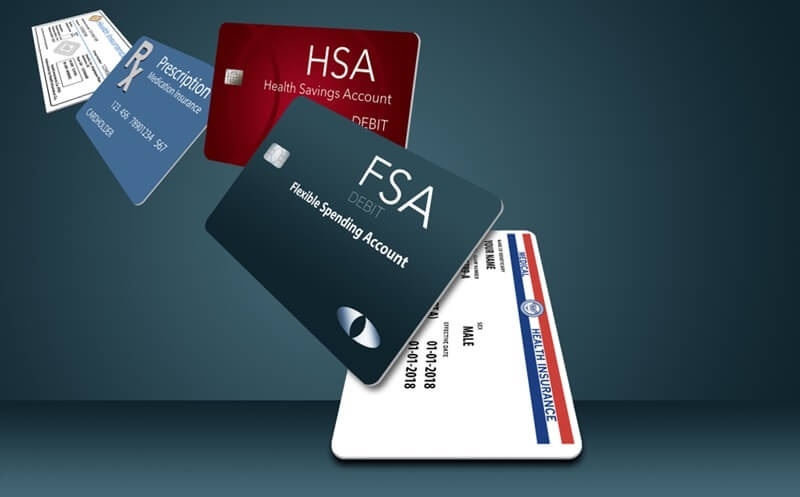
US health insurance premiums are a massive concern for people and households. Premiums, deductibles, copays, and other out-of-pocket costs can lead to tremendous financial strain. For many, learning to save on these figures is as crucial as choosing the right insurance coverage. Amongst the best tools you possess is HSA and FSA for insurance costs, enabling you to use tax-favored accounts to pay for expenses.
These accounts are so great because they let you use pre-tax dollars to pay for qualified medical expenses, effectively reducing your tax bill. With tax-free insurance accounts, you can save both short- and long-term money. To take full advantage, you must have FSA vs HSA explained, how to save money with HSA, how they work, and where they fit into overall health insurance cost-saving plans.

Essentially, Health Savings Accounts (HSAs) and Flexible Spending Accounts (FSAs) are intended to assist individuals in paying medical expenses without having to pay higher taxes than they must.
Health Savings Account (HSA): You only qualify for this account if you have a High Deductible Health Plan (HDHP). The HSAs are a threefold tax benefit: contributions are deductible, the account accrues interest tax-free, and qualified distributions are tax-free as well. They are a priceless part of health insurance cost-cutting measures for individuals who qualify.
Flexible Spending Account (FSA): FSAs are company-sponsored accounts that also permit you to set aside pre-tax income for healthcare costs. They come with strict use-it-or-lose-it provisions, however, unlike HSAs. Most FSAs require you to expend the balance within the plan year, although some companies allow a limited rollover amount or grace period.
Comparing FSA and HSA for insurance cost, both are valuable but have different rules and flexibility.
For most people, the two accounts are confusing to select among them. Here's FSA vs HSA explained in a straightforward manner:
Eligibility: You must have a high deductible plan if you wish to receive an HSA. FSAs are provided by most employer plans with any form of deductible.
Contribution Limits: Contribution limits for HSAs in 2025 are $4,300 for an individual and $8,650 for a family, with a catch-up contribution of $1,000 for those age 55 or older. FSAs are limited to a $3,200 annual limit by the IRS.
Rollover Options: HSAs permit your funds to roll over without end. FSAs don't normally, but some employers permit up to $640 to roll over or have a short grace period.
Account Ownership: You own an HSA, and it's yours no matter what happens with a job change. An FSA belongs to the employer, so money is lost if leaving.
Investments: HSAs allow investment after minimum balance requirements are met, so they're long-term savings accounts. FSAs offer no investment options.
Remembering FSA vs HSA, HSAs are more flexible and have more long-term potential, but FSAs are optimal for short-term medical bills.
Both accounts function very well for covering health insurance-related expenses. The following are the main ways in which they help:
Covering Deductibles and Copays: These out-of-pocket costs are among the largest for insured families. HSAs and FSAs can be used directly for deductibles, copays, and coinsurance.
Prescription Medications and Supplies: Both allow you to spend pre-tax money on prescription drugs and the majority of over-the-counter medications. Even medical aids and supplies, such as blood pressure gauges or crutches fall within this.
Dental and Vision Expenses: Since dental and vision are excluded from most health care policies, an FSA or HSA can be a huge advantage. You can use pre-tax money to buy cleanings, glasses, contact lenses, and even corrective surgery.
Premiums in Special Cases: Though FSAs are not generally spent on insurance premium payments, HSAs do allow the payment of premiums under a limited situation. For example, you can spend HSA funds for COBRA premiums, Medicare premiums, or health insurance premiums related to unemployment.
In every case, insurance fees paid for using tax-free accounts reduce the actual cost of care by decreasing your taxable income.
For qualified individuals, an HSA offers short-term savings opportunities as well as long-term accumulation opportunities. This is how to save with HSA effectively:
Maximize Contributions: Pay the maximum to the IRS every year to save taxes and accumulate funds for your future healthcare costs.
Invest Beyond Basics: Investing in your HSA is typically permitted by most HSA providers when your account has a minimum balance. Using your HSA to save for retirement can cause your money to grow for many decades.
Use Cash for Little Things: Spending little things out-of-pocket and leaving your HSA for big things makes your account grow tax-free for the future.
Consider it a Retirement Tool: At 65 and beyond, withdrawals from your HSA for non-medical purposes are taxed like ordinary IRA withdrawals, although medical costs remain tax-free. That places the HSA among the finest health insurance expense-saving vehicles for long-term planning.
Take Advantage of Employer Contributions: Certain employers make contributions to their employees' HSAs. This is found money that adds to your savings.
Having learned how to save money with HSA, it's not hard to see why personal finance gurus have named it one of the best tax-advantaged accounts.
Planning is necessary in order to effectively use these accounts. Below are some tried-and-tested strategies for health insurance cost savings:
Estimate Annual Expenditures: Contribute to your HSA if you foresee significant medical procedures, dental treatment, or prescriptions throughout the year.
Use Preventive Services: The majority of health insurance policies cover preventive services without any charge. Post this to your HSA or FSA for follow-up eligible expenses to lower total expenditure.
Benefit from Retail Partnerships: Pharmacies, online retailers, and even warehouse clubs accept HSA or FSA cards on a frequent basis, so it's easy to purchase eligible products.
Review Eligible Expense Lists: The IRS publishes a concise list of qualified medical expenses. Knowing in advance what is eligible keeps you from ever missing out on savings.
Sync Accounts with a Spouse: If your mate has an FSA and you qualify for an HSA, plan contributions well to avoid overfunding one and underfunding the other.
With foresight, you can make HSA and FSA for insurance costs a great part of your overall economic strategy.
While these accounts are of great benefit, there are a few traps that will lower their value:
Avoiding these errors ensures that you get the best benefit of using tax-free accounts for health and insurance costs.
United States medicine is rising in cost, but there are ways to contain it in a cost-effective way. FSA and HSA for insurance costs provide an opportunity to reduce taxable income, reduce out-of-pocket costs, and even accumulate savings for future medical costs. Having FSA vs HSA explained, choosing the right account for your ailment, and employing smart planning, you can reduce your finances substantially.
This content was created by AI